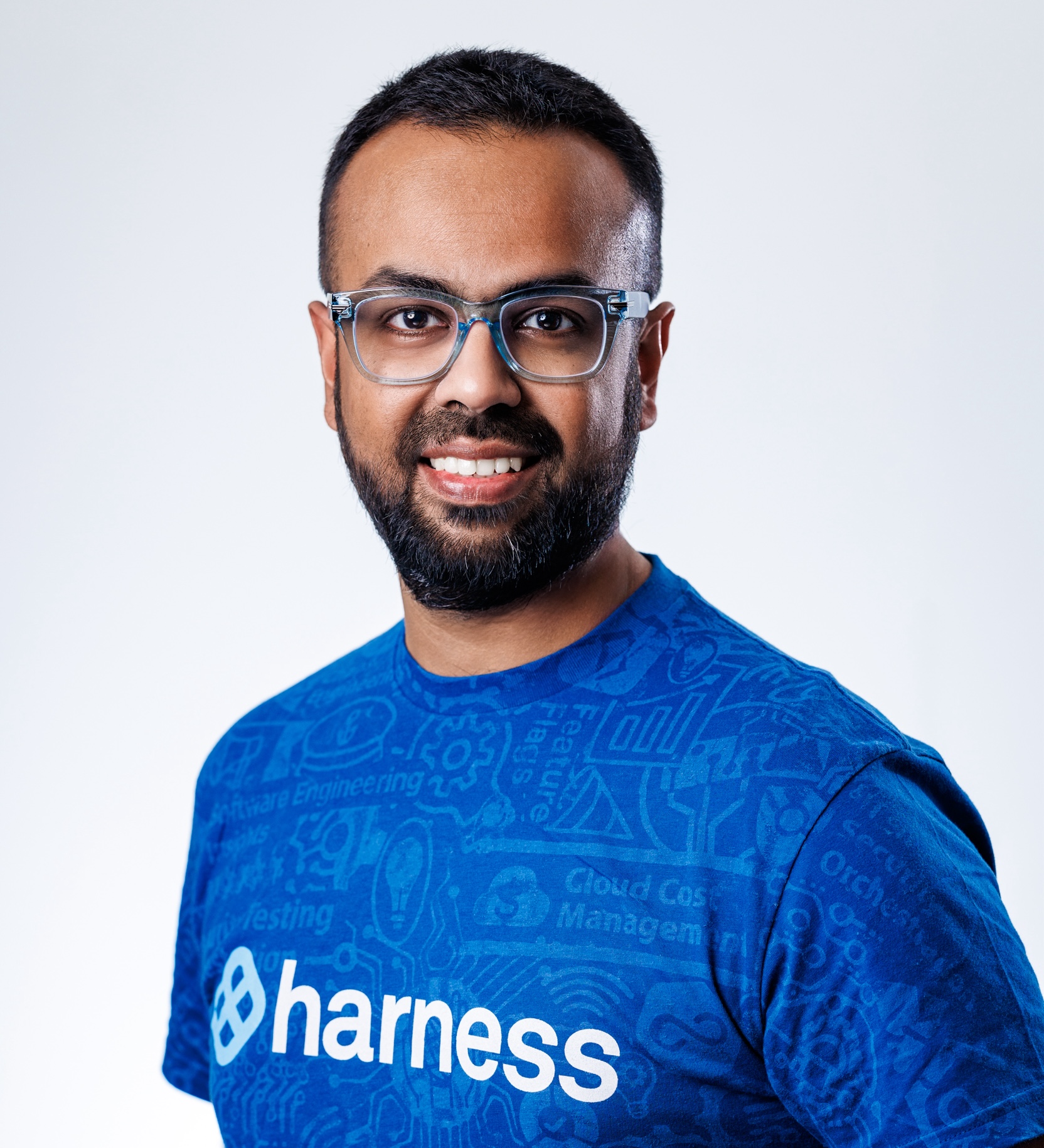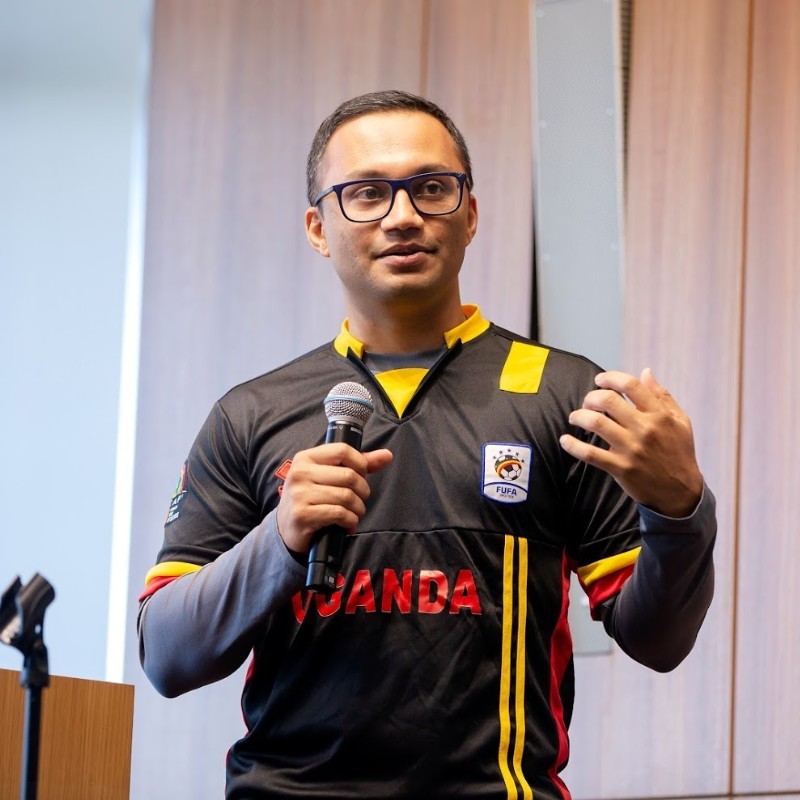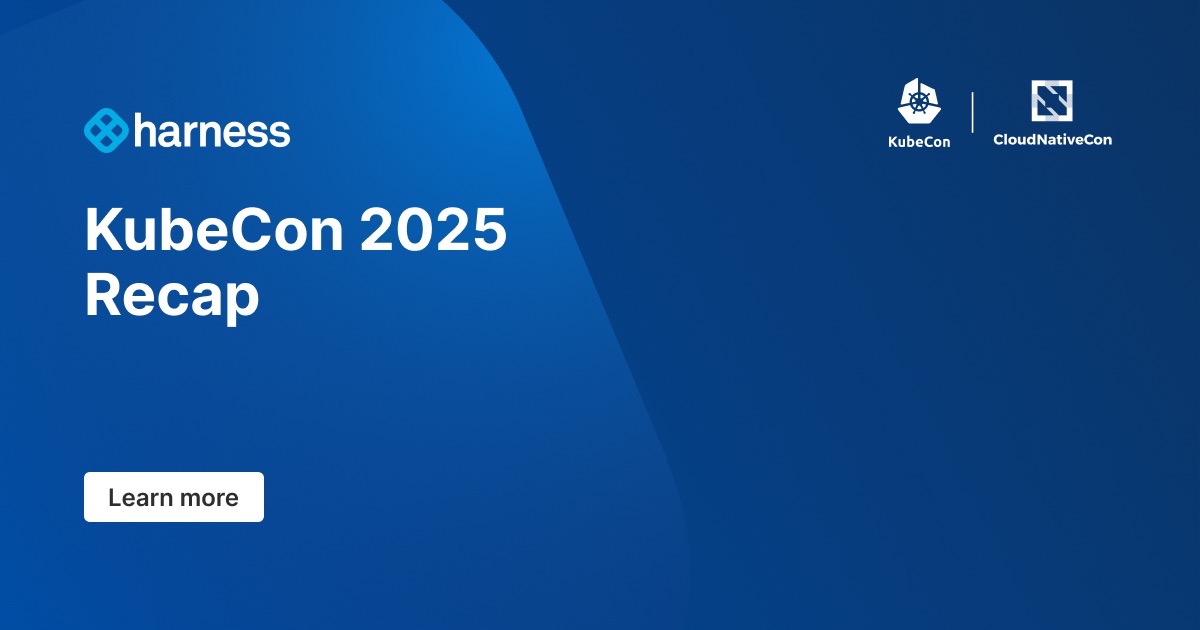
KubeCon NA 2025 marked the dawn of the "AI Native" era, highlighted by the CNCF’s new Kubernetes AI Conformance Program to standardize AI infrastructure. Harness amplified this vision by showcasing how Agentic AI is transforming software delivery into intelligent, adaptive pipelines that empower engineering teams.
Atlanta did not just host KubeCon this year. It hosted the beginning of a new chapter for cloud native. Over four incredible days, more than 9,000 attendees celebrated 10 years of CNCF, explored the next generation of open source innovation, and most of all, grappled with the question echoing through every keynote, booth, and hallway track:
What does AI native really mean for our community?
Harness at OpenTofu Day: Community + Contributions Momentum
KubeCon week kicked off with OpenTofu Day, one of the few co-located events this year, and Harness had a strong presence as contributors and community leaders. Larry Bordowitz, a core maintainer, joined technical discussions on backend improvements and enterprise interoperability and participated in a panel on OpenTofu’s roadmap under CNCF governance. Roger Simms, on the OpenTofu Technical Steering Committee, met with maintainers and platform teams to align on long-term standards for vendor neutral IaC. We also released the Practical Guide to Modernizing Infrastructure Delivery, showing how teams like TransUnion and Fidelity scaled IaC, reduced toil, and built secure GitOps workflows in preparation for AI driven infrastructure delivery.

The themes of the day such as openness, trust, and modernization were echoed in talks like Fabrizio Sgura’s session on 5 Security Tips for Terraform, where he highlighted Harness’s native integrations with SCS and STO. This kind of independent validation matters because it shows the industry increasingly recognizes that modern IaC requires secure, integrated pipelines, not just template execution. OpenTofu Day underscored one message: the future of IaC is open, and Harness is committed to leading that future through contribution, community partnership, and enterprise-ready tooling.
A Decade of Cloud Native and the Dawn of AI Conformance
The opening keynote marked a milestone: 10 years of CNCF and a clear signal that the next decade will be defined by AI workloads running natively on Kubernetes.
We saw the unveiling of the Kubernetes AI Conformance Program, a community-driven initiative ensuring that AI and ML workloads run consistently across clouds and hardware accelerators. The live demo, deploying a Gemma model on a Kubernetes 1.34 cluster using Dynamic Resource Allocation (DRA), showed how GPUs and TPUs are now first-class citizens in Kubernetes. The message was clear: the cloud native community is laying the foundation for standardized AI infrastructure across every cloud and cluster.
This community is trying to standardize AI inference workloads across every cloud and system out there.
That sentiment aligns perfectly with Harness’s vision that AI is no longer an add-on to software delivery; it is becoming the delivery substrate itself.
Lightning Talk Highlight: Chinmay Gaikwad at the Google Cloud Booth
At the Google Cloud Booth, Chinmay Gaikwad, Harness’s Director of Product Marketing, presented “Creating Enterprise-ready CI/CD Using Agentic AI,” demonstrating how AI is making continuous delivery faster and more secure at enterprise scale. Harness’s extensive knowledge graph caught the attention of the audience.

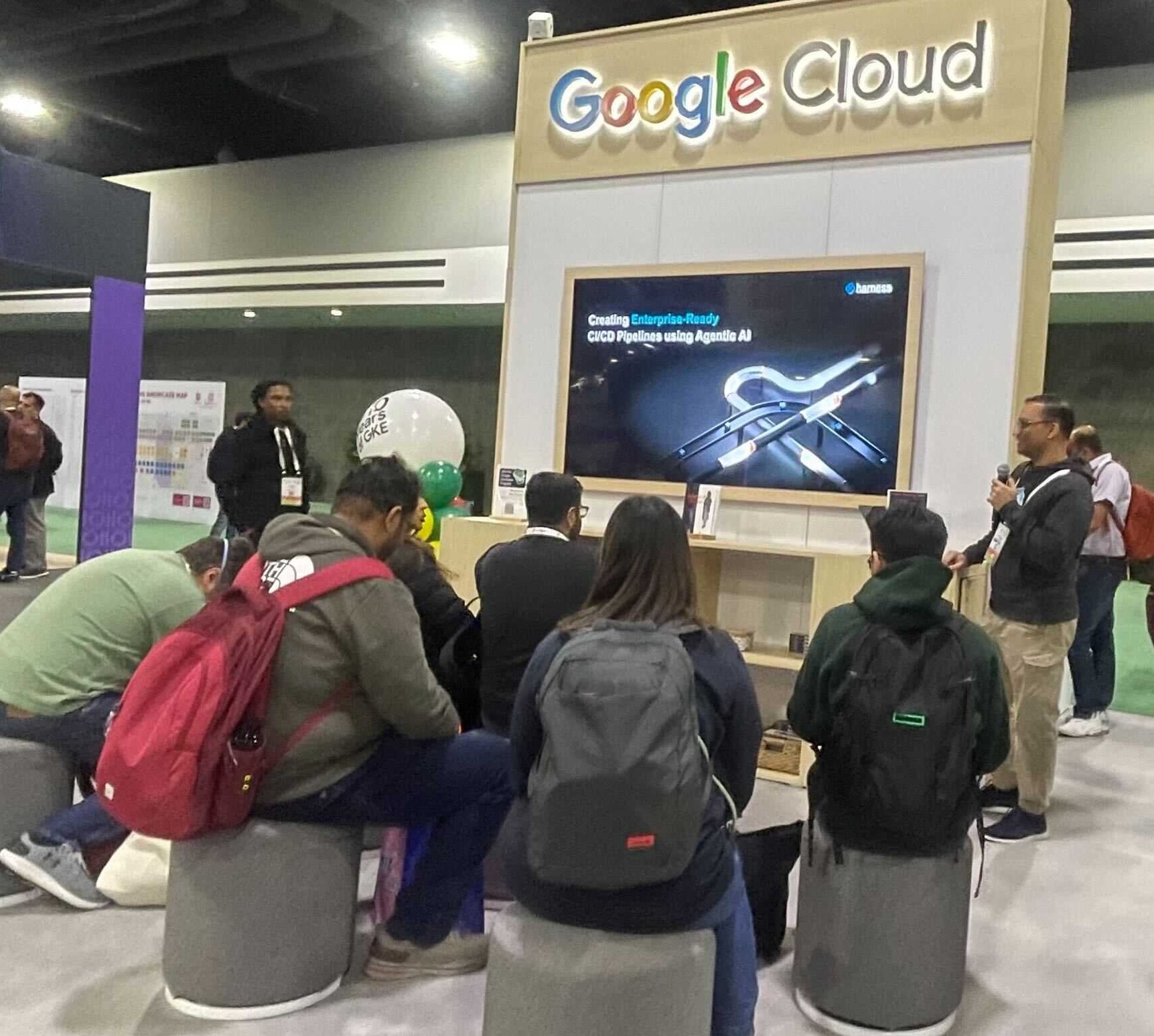
From Cloud Native to AI Native: Adobe’s Call for Acceleration
In one of the most memorable keynotes of the week, Joseph Sandoval (Adobe) described our evolution from Linux to Cloud Native to AI Native. He introduced the idea of the Agent Economy, where autonomous systems observe, reason, and act, and emphasized that Kubernetes must now evolve to orchestrate them.
This transformation requires more intelligent scheduling, deeper observability, and verified agent identity using SPIFFE/SPIRE. Sandoval’s call to action summed up the mood of the entire conference:
AI native is not going to be built by one project or one company. It will be built by all of you. The community is the accelerator.
This perfectly reflects what we showcased at Harness: Agentic AI as an engineering accelerator, powering adaptive, intelligent pipelines that continuously learn and optimize delivery.
Security Takes Center Stage: From Supply Chain to Zero-CV Malware
In the keynote “Supply Chain Reaction: A Cautionary Tale in K8s Security,” speakers S. Potter and A.G. Veytia delivered a wake-up call on supply chain attacks. A compromised compiler injected crypto-mining malware into a “clean” image, bypassing traditional vulnerability scanners.
Your image has zero vulnerable components, so there is nothing to report. It is zero-CV malware.
Their advice was practical: secure the supply chain through attestation (SLSA), policy enforcement, and artifact signing with Sigstore. Harness users saw this principle in action at our booth, where we demonstrated policy-as-code and provenance-aware delivery in our CI/CD pipelines.
Apple Containerization: Secure, Private Containers for Developers
Apple introduced Apple Containerization, a new framework that runs Linux containers directly on macOS using lightweight microVMs. Each container boots a minimal Linux kernel, runs as a static executable, and starts in under a second. This design combines the security of VMs with the speed of containers, creating safer, more private development environments.
Sessions That Stood Out
Beyond the keynotes, technical sessions reinforced a clear trend: intelligent, automated, and developer-first platforms are the future.
- Efficient Kubernetes Autoscaling with KEDA – Practical scaling strategies to handle latency, performance, and cost efficiency.
- Beyond the Dashboard: Modern Observability for Platform Engineering – How platform teams are embedding observability directly into developer workflows.
- Node Manager at Yahoo – Automation-first node maintenance across 8,000 nodes and 37 clusters.
- GitOps for AI Agents – Using Argo CD and Argo Workflows to manage intelligent, stateful agent pipelines.
- Managing a Million Infra Resources at Spotify – Lessons in declarative infrastructure and platform modularity.
- Deploying Backstage in a Large Organization – Turning internal developer portals into true developer accelerators.
- GitOps and the Manifest Dilemma – How GitOps tools like Helm, Crossplane, and Kro can align around common standards.
Harness at KubeCon: Real AI for Real Delivery
At Booth #522, the Harness team showcased over 17 products (such as CI, CD, IDP, IaCM, security, testing, and FinOps products), sparking conversations on the practical side of AI in DevOps, Testing, Security, and FinOps.
Harness’s visual pipeline creation and creating pipelines using AI we hot topics at the booth.

Harness supports many CNCF projects, including ArgoCD, Backstage, LitmusChaos, and OpenTofu. The enthusiasm was electric, and our booth became a hub for deep technical conversations, spontaneous demos, and, yes, the best swag of the show.
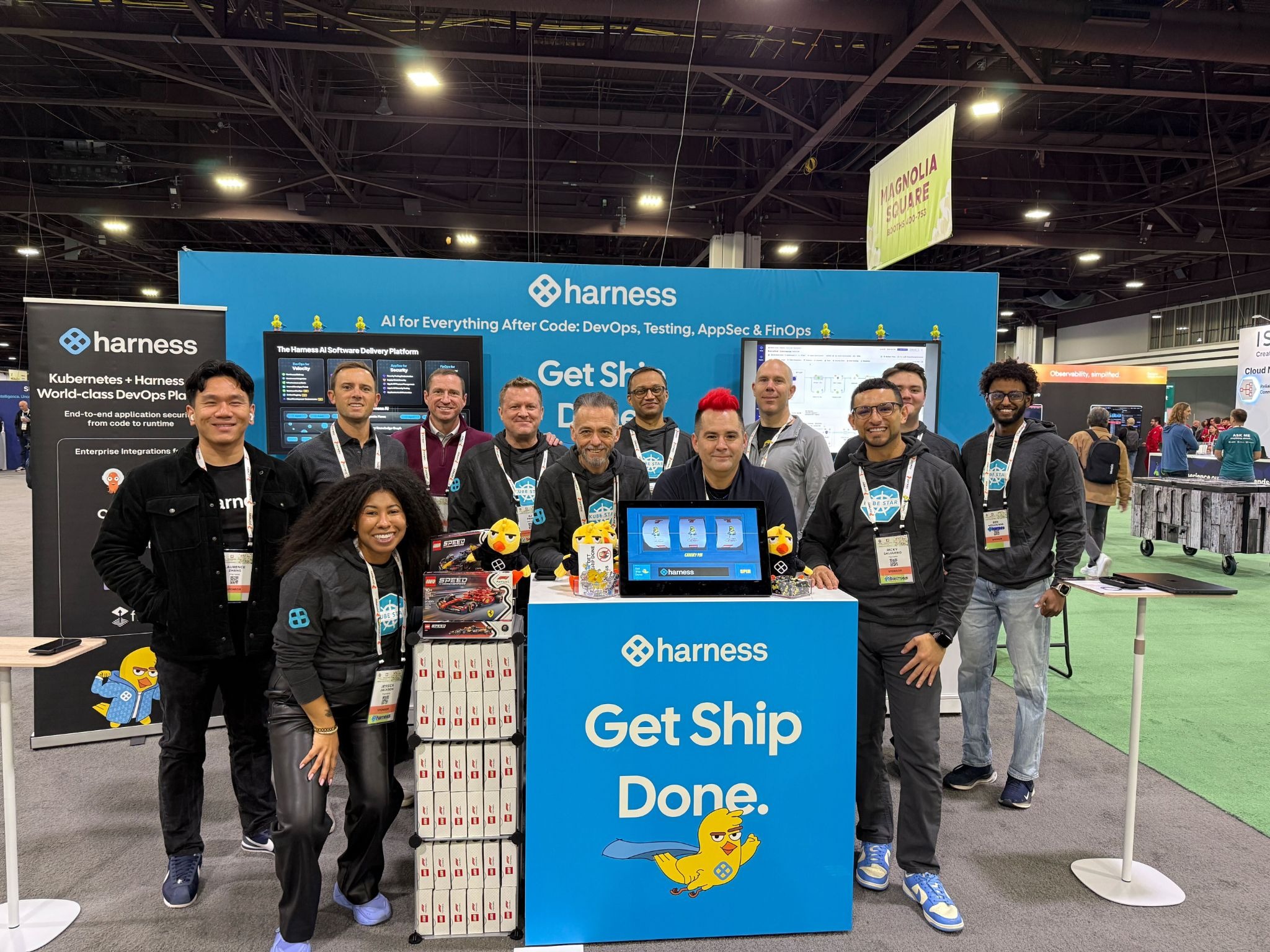
Looking Ahead: The AI Native Future
If KubeCon 2024 was about AI awareness, KubeCon 2025 was about AI activation. From Kubernetes AI Conformance to Agentic orchestration, cloud native is evolving into the control plane for intelligent systems.
At Harness, we are building for that future where:
- Pipelines think ahead of engineers.
- Observability explains itself.
- AI native delivery becomes the new standard for modern teams.
See What’s Next
Could not make it to Atlanta? Experience the technology everyone was talking about.
KubeCon 2025 proved one thing: the future of cloud native is intelligent, adaptive, and collaborative. And at Harness, we are building it.
